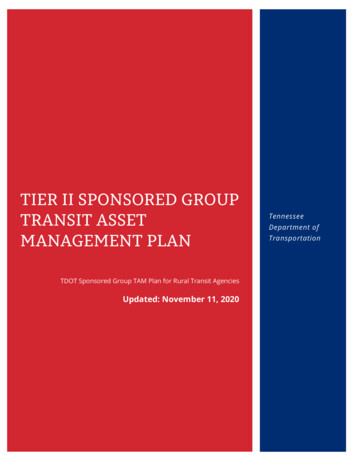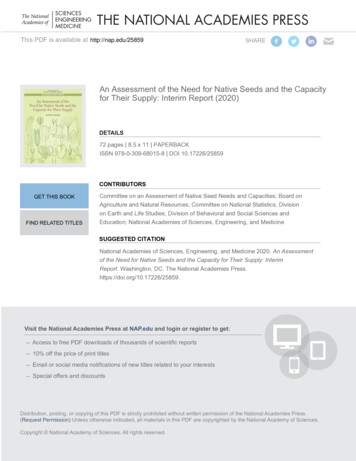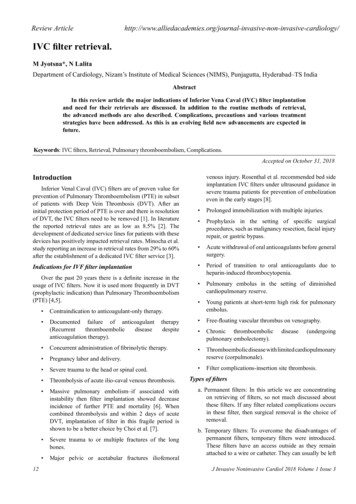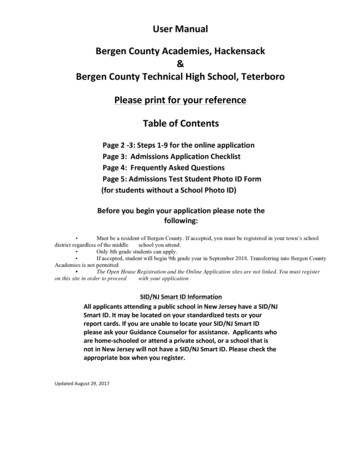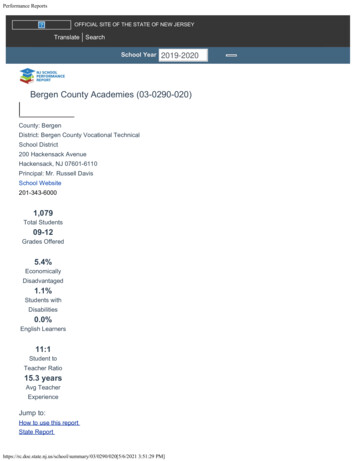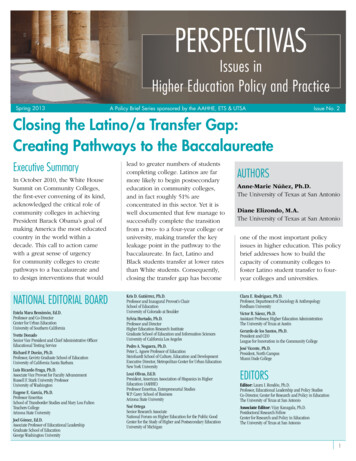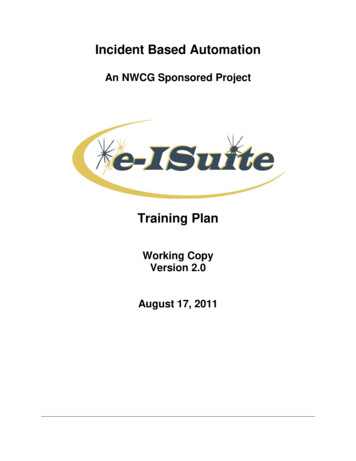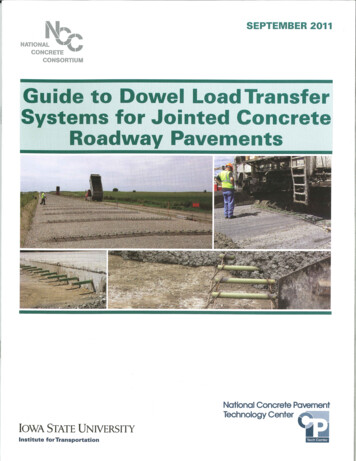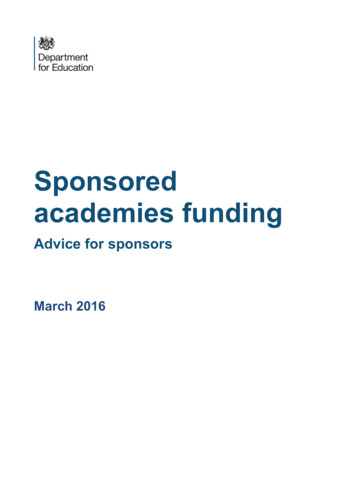
Transcription
Sponsoredacademies fundingAdvice for sponsorsMarch 2016
ContentsSummary3About this departmental advice3Expiry or review date3Who is this advice for?3Key points3Part 1: Sponsored academies pre-opening funding41.1 Introduction and the grant in summary41.2 Project development support51.3 Establishing the AT- academy trust (AT) as in contents?61.4 Roles and responsibilities61.5 Payment arrangements71.6 Reporting arrangements71.7 Annex 181.8 Annex 212Part 2: Sponsored academies post-opening start-up grant132.1 Introduction132.2 Primary academies143.3 Secondary academies164.4 Alternative provision academies and special academies185.5 All-through academies and mergers186.6 Further information18Part 3: Environmental improvement grant for full sponsored academies only203.1 The purpose203.2 Funding allocation213.3 Process outline223.4 Other matters233.4 Annex A243.5 Appendix 1272
SummaryAbout this departmental adviceThis is departmental advice from the Department for Education (DfE). This advice is nonstatutory, and has been produced to help academy sponsors understand the funding thatis available to them. This advice was originally issued in July 2013 (announcing the newpre-opening rates from 1st September); it was reissued in February 2014 when Part 2was updated.Expiry or review dateThis advice will be reviewed periodically.Who is this advice for?This advice is for academy sponsors only and does not apply to converter projects.Key pointsThis document gives sponsors information about the DfE funding that is available toacademy trusts for full sponsored, intermediate and fast track academy projects,including grant payment and reporting arrangements. In some situations, the project typeattracts a differing level of funding support – these are clearly identified in this document.Part 1 explains that the proposed funding is to cover the pre-opening costs such as staffrecruitment, project management, legal advice, and any relevant school improvementinterventions. Some key changes have been made to the mechanism for paying andreporting of these grants. In particular, grant letters have been streamlined and thereceipt of the declaration of expenditure has been strengthened stressing that it must becompleted for all project types.Part 2, which is about post-opening support grants, has not been changed since it wasupdated in February 2014.Part 3 relates to the environmental improvement grant (EIG), which is available only tofull sponsored academies. Changes have been made to the approval and administrationof the grant.3
Part 1: Sponsored academies pre-opening fundingIntroduction1.On 1 September 2013, the DfE introduced new pre-opening start-up funding ratesfor all sponsored academies (fast track, intermediate and full sponsored) - these ratesremain unchanged. This updated version introduces changes to the grant declarationrequirements, and streamlines the reporting mechanisms for all funding routes. DfEproject leads (PL) can give more information about which funding route applies to aparticular project and provide support on the changes.Pre-opening funding in summary2.Pre-opening stage funding should be used by academy trusts (ATs) to cover thecosts of the necessary work required up to the point at which the academy opens. Thefunding allocated are set and final– no further funding will be available. In view of this,ATs are encouraged to include a contingency amount within their budget to cover anyreasonable unexpected costs. The funding will be paid directly to ATs who will thendecide how best to use the funds to deliver their project. Any unspent funds will betransferred by the AT to the academy’s bank account upon opening.3.The grant amounts are: 110k for full sponsored primary schools and special schools; 150k for full sponsored secondary and all-through schools; 90k for intermediate primary/special schools; 115k for intermediate secondary schools; 70k for fast track primary/special schools; and 80k for fast track secondary schools.Please note: the above funding values include the 25k support grant to establish theacademy.For alternative provision (AP) academies the amount of pre-opening funding will benegotiated on a case-by-case basis. These amounts will be reviewed periodically. Pleasespeak with your DfE PL for further advice.4.The grant will be paid in line with a payment profile agreed by the PL during theproject development phase (see paragraphs 12 - 14 for further details), so that funding isnot paid too far in advance. Payments will be made to the AT rather than to the sponsor.If the AT is not already in place, an early task will be to ensure that it is established (seeparagraph 9). We no longer require copies of invoices – it will be up to the AT to maintain4
appropriate financial records, as we may require financial reports (including supportingdocumentation) to be completed during the project development phase.Project development support5.Once the regional schools commissioner (RSC) has agreed to the release of preopening funding, the nature of project development support will be agreed by the DfE’sproject lead (PL) and sponsor/AT. We envisage that fast track and the majority ofintermediate projects will not require formal project management. However, along withbudgetary autonomy, ATs will be free to decide what project management support theyneed in establishing their academies, and how to secure it. ATs have two options forsecuring project development support, which are to: procure openly; or undertake the work ‘in-house’ using AT employees (see paragraph 7 for furtherdetails).6.As contracting authorities in their own right, ATs can buy in commercial servicesfrom other sources, provided that the method they use to do so complies with EU andpublic procurement regulations. EU procurement regulations state that if the value of acontract for goods or services is greater than 164,176 (from January 2016), a full, EUwide tendering process must be carried out. This can take up to six months to complete.7.If the AT wishes to undertake the project management (PM) work ‘in-house’, theywill need to ensure they have employees with the capacity and the right skills/experience.To comply with procurement law, only AT employees can undertake this work. Sponsorscannot profit from sponsoring an academy. Where an AT wants to deliver its ownprojects, they must do so “at cost” with no profit margin factored in. This means withoutcharging any element of profit on the goods and/or services provided. For people basedresources, this will be based on a day rate calculated by dividing the salary of the personplus employment related taxes (for example, in the UK; national insurance tax, pension,essential training and reasonable office and other directly employee related costs) by 210working days a year pro rata as appropriate. Incidental travel expenses and (if required)accommodation and subsistence will also be at cost. Other services will operate withinthe no profit principle. All such calculations should be subject to open book and auditrequirements. Cost information should be transparent and clearly set out how the costshave been calculated. VAT is not chargeable where the AT delivers projects as this is nota commercial (trading) arrangement. Where the AT itself incurs VAT charges (e.g.printing costs), the VAT is expected to be reclaimed direct from HMRC where appropriateto the ‘provision of free education’.8.Not more than 25k of this pre-opening funding should be used to cover all thetasks necessary to establish the academy. Typically, this will include: project management services;5
education advice and development of the educational brief/plan, curriculumand policies; legal services including establishing the AT, dealing with land transfer issuesand preparing the Funding Agreement documentation; communications and marketing support, including running or supporting theacademy consultation process; HR and recruitment services to support any TUPE process and senior leaderappointments; and financial management and advice to establish the AT’s finance andmanagement information systems.Establishing the academy trust9. A new sponsor may plan for the AT to undertake PM work in-house, but haveinsufficient funds to cover the legal costs of establishing the AT. In thosecircumstances, the DfE could make an advance payment of pre-opening funding (thesupport grant) of 25,000 to cover those costs. The 25,000 would form part of thepayment profile agreed by the PL and is not in addition to the total amount agreed bythe RSC.Roles and responsibilities10.The PL’s role is to provide help and support to the AT in delivering the projectwithin the funding provided. PLs will help ATs understand their procurement andgovernance responsibilities and the associated risks and liabilities, and the full range oftasks to be completed during the project development phase. They are also a source ofadvice and support, where needed, in developing the pre-opening budget – they haveexperience of delivering academy projects and the typical costs of the various activities.11.The grant letter and this guidance is intended to help sponsors understand theirroles and responsibilities in spending public money in line with public finance andprocurement regulations: HM Treasury’s managing public money guidance is ging-public-money The Public Procurement Regulations are urement-directives6
Payment Arrangements12.Once the RSC has agreed to the release of pre-opening funding, the pre-openinggrant letter is issued. The first payment is made once the AT has been incorporated andthe relevant Annex to the grant letter has been completed and returned to the PL. Thegrant will be paid in line with the payment plan agreed with the PL and be automaticallypaid during the project development phase. Where project timescales indicate, this maybe more than one payment, however, if the academy opening date is three months orless from the RSC’s agreement to the release of pre-opening funding, a single grantpayment will be made.13.The payment profile is designed to ensure that ATs will have sufficient fundingavailable to meet their needs. It also accommodates the varying timescales to developsponsored academy projects, but without paying too far in advance in order to complywith the HM Treasury’s managing public money requirements. The model grant letter isat Annex 1.14.The grant letter makes provision for the DfE to withhold or recover grant paymentsin certain circumstances. These are where there are grounds to believe that it has notbeen used or will not be used in accordance with the terms of the grant letter; wherethere are grounds to believe that the funds provided have not been properly managed; orwhere there are some other circumstances which would make it appropriate to withholdpayment.Reporting arrangements15.The grant letter sets out clearly the need for ATs to conform to the requirements ofParliamentary control in relation to the use of public funds. Web links providing additionalinformation on the use of grant and to the Academies Financial Handbook are alsoprovided in the letter. ATs should read this additional information to remind themselves oftheir duties, including their duties as charity trustees. The academy will be required toinclude the pre-opening period for external assurance in the first set of its accounts.16.For all funding routes, ATs must keep records clearly identifying the expenditure ofthe pre-opening grant. To assist ATs, a monthly report template, including guidance forcompletion by project managers is at Appendix 1. For full sponsored projects, the PLmay request this information to ensure the pre-opening grant is spent effectively.However, it is for PLs to agree the level of reporting with the AT.17.ATs are also required to report on the outturn project spending by completing theDeclaration of Grant Expenditure form (Annex 2) when the academy opens. This is toensure that the grants have been used for its intended purposes and in accordance withthe Conditions of Grant. If any grant paid has not been used on the establishment of theacademy or school improvement interventions, the AT must transfer the balances to theacademy’s bank account, and record the amount transferred on the declaration form. PLs7
will remind ATs that the declaration is required and will ensure ATs provide thedeclaration.8
Annex 1Pre-opening funding: grant letterThe Secretary of State has agreed to allocate a grant under section 14 of the EducationAct 2002 of up to a maximum of {xxxxxxxx} as a contribution towards expenses incurredby the [Insert name of academy trust] in establishing the academy and as part of anysupporting school improvement interventions.ConditionsThe grant is paid under the following conditions and can only be used for theestablishment and necessary school improvement interventions in [name ofschool] through any of the following activities:Establishment of academy Obtaining legal advice in respect ofestablishing the academy,The costs of software licencetransfers,HR/TUPE advice,Re-branding costs, andExpenses incurred in setting up theacademy trust.School improvement interventions Leadership support,Teaching and learning interventions,Systems improvements,Pupil focused interventions,Curriculum re-design, andStaff restructuring.You are recommended to review the full conditions of grant – these can be foundat Grant funding agreement: terms and conditions - Publications - GOV.UKAudit and repaymentYou should retain records to show that the grant has been used for the purposes outlinedabove for 6 years after the end of the financial year in which the expenditure has takenplace. The books and records of the school relating to the claiming and use of grant willbe open to inspection by the National Audit Office and representatives of the Secretary of
a commercial (trading) arrangement. Where the AT itself incurs VAT charges (e.g. printing costs), the VAT is expected to be reclaimed direct from HMRC where appropriate to the ‘provision of free education’. 8. Not more than 25k of this pre-opening funding should be used to cover all the tasks necessary to establish the academy. Typically, this will include:
